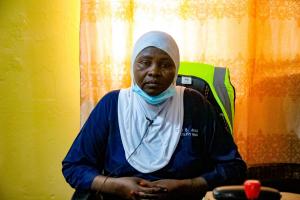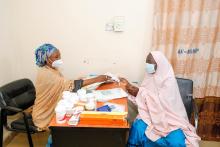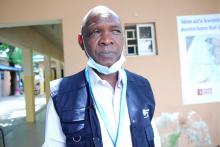Health workers leaving no stone unturned, responding to mental health cases in the Northeast
Maiduguri November 4, 2021- In Nigeria’s North East, 12 years of insurgency and attendant security challenges had major impact on the mental health of people living in the region. Since the beginning of the conflict, more than 43 000 people have died from Boko Haram violence
Mrs Balu Bukar Adamu is a Nurse and one of the frontline health workers at Herwa Peace Primary Health Care (PHC) Centre in Maiduguri, Borno state, a facility that offers mental health services to patients affected by the insurgencies for the past four years
Trained by the World Health Organization (WHO) on mental health response in 2017, the 53-year-old nursing officer with 31 years work experience said she has been applying the newly acquired skill to handle mental health cases in the PHC.
Passionate about her job and having special interest in mental health cases especially when living amongst them, Balu sees it as something personal and vows to do her best to support and render services to the patients. She also loves delivering healthy babies and making sure both mother and baby are fine during and after delivery.
“People here are living through a protracted and ongoing crisis for an extensive period. And, while majority do cope in situations of chronic disaster, a significant number of people develop mental health problems” says Balu.
“Prior to the training, we found it very difficult to respond to mental health cases, we did not know how to relate with them talk less of convincing them to take certain actions that will help their situation. Making them accept medication was also a hassle, we had to refer almost all patients to the Federal Neuropsychiatric Hospital but we hardly do so now as we are able to handle almost all cases.”
“Before, there is so little understanding about mental disorders and it waas clearly stigmatized. There is also so much superstition surrounding it: cursed by devils, married a witch, swallowed an evil snake and so on.”
People who do seek care for mental health problems generally go to traditional healers. There the evil is cast out, heads are shaved, herbal medicines are given, spells are cast.
“Now many families come to us for help because of how we handle their cases with expertise from the training we got from WHO, we earn their trust and they refer other people to come for help.”
“On an average day, we attend to at least 30 mental health patients and it gladdens my heart when I see them getting better, we offer counseling, mental assessment and give medications for free. Currently, we have over 200 patients under the programme, receiving medications for free provided by WHO.
The most common disorders include post-traumatic stress disorder (PTSD), psychosis, depression, suicidal behaviors, and sometimes substance abuse.”
A beneficiary, Hassan mentioned that he has been battling with mental health for a while but finally got assistance through this program “I was gallivanting round the town, nobody knew what was wrong with me until a friend of mine suggested I go to Gwozari PHC, another facility in Maiduguri supported by WHO where services are rendered for free with the support of WHO. I went there and I was diagnosed with PTSD, I got free medication for the initial three months and since then I have been going regularly. The counseling and medication has helped me a lot, I am now stable as I am able to work and earn a living.”
After a disaster, communities can be hit by displacement, breakdown of family structure, lack of services, poverty, or an increase of violence. All of this can lead to many psychosocial problems for individuals, families, communities and society.
Many people in the Northeast conflict areas had to flee with their families, some have lost relatives, and properties and are left with no other option but to undertake dangerous journeys to cities like Maiduguri.
In places where these issues are ongoing, mental health problems and disorders are often underestimated and undertreated, especially if the mental health problems themselves are chronic.
Mr Samuel Tarfa, the WHO Mental Health Officer coordinating mental health activities in the north east region mentioned that majority of support comes only in psychosocial support and there was a huge gap in specialized mental health services hence the need for WHO to step in.
WHO is currently collaborating with Federal Neuropsychiatric Hospital, Maiduguri, the Hospital Management Board and Primary Heath Care Development Agency to ensure that those gaps are filled.
Nurse Yagana Mustapha, a Psychiatric Nurse with Federal Neuropsychiatric Hospital posted to supervise mental health activities at Herwa Peace PHC center mentioned that “we monitor the cases and evaluate the progress and in situations where symptoms persist, we refer them to the Neuropsychiatric Hospital for further assistance.”
“From October 2017 to date WHO has been supporting activities within communities and internally displaced persons camps to make sure no mental health case is left unattended. So Far, 547 healthcare Workers from 200 PHCs across Borno, Adamawa and Yobe States have been trained through the
Mental Health Gap Action Program (MhGAP) and are currently being supervised by psychiatric nurses to provide specialized mental health care” says MrTarfa.
The MhGAP program was made possible through support from United States Agency for International Development (USAID), the European Union (EU) and the Nigerian Humanitarian Fund (NHF).
Technical Contacts:
Dr Kelias Msyambozak; Email: msyambozak [at] who.int (msyambozak[at]who[dot]int); Tel: +234 906 278 4292
Dr Aiwonodagbon Benjamin Ohios; Email: aiwonodagbonb [at] who.int (aiwonodagbonb[at]who[dot]int); Tel: +234 813 822 8952
Dr Samuel Tarfa; Email: tarfas [at] who.int (tarfas[at]who[dot]int); Tel: +234 906 274 0633





